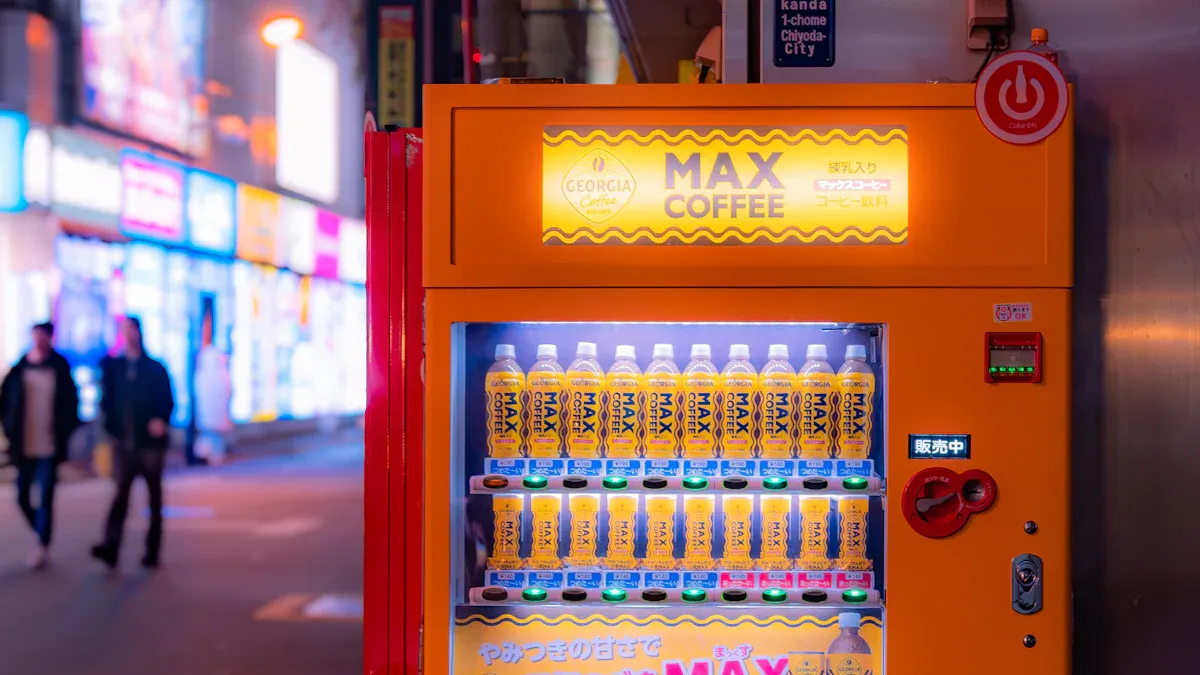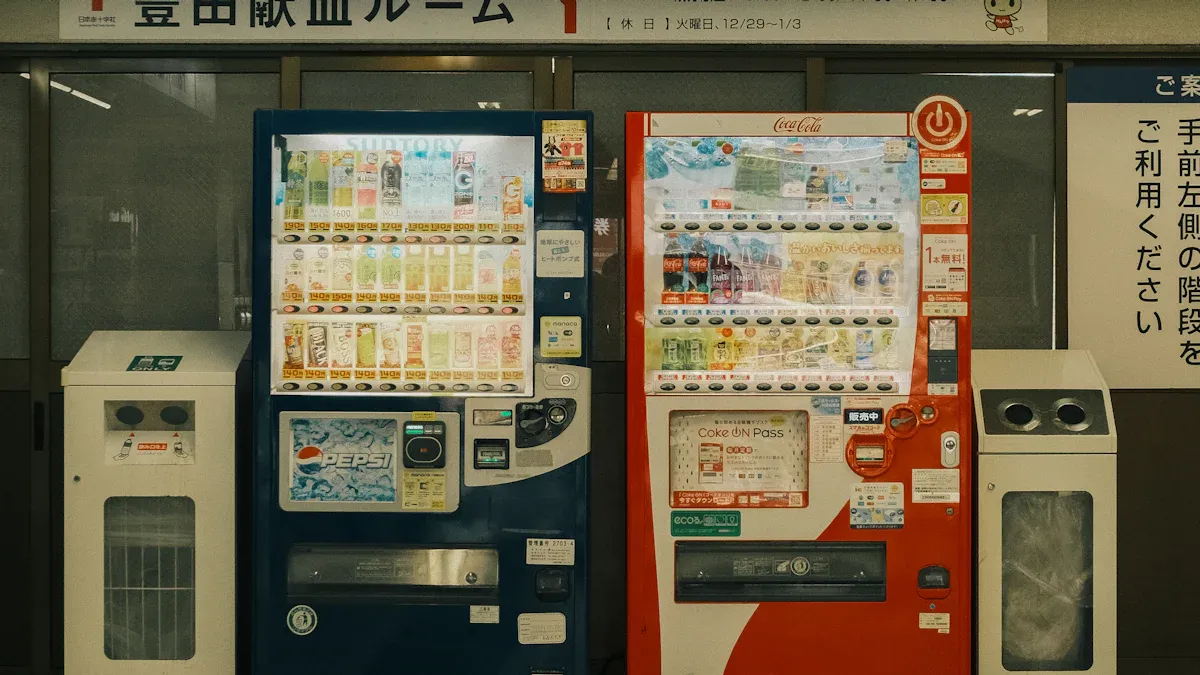The Truth About Japan’s Used Panty Vending Machines

You may wonder if Used Panty Vending Machines really exist in japan today. Many people hear stories about these machines and believe they are common. The truth is very different.
Many people mistakenly believe that used panty vending machines in Japan sell actual used underwear. However, reports reveal that the items sold are often manufactured to look used, and the actual machines are now rare due to strict regulations.
You deserve clear answers. This article will help you separate fact from fiction.
Key Takeaways
Used panty vending machines are rare in Japan today. The government banned them in 1993 due to legal and social concerns.
Many stories about these machines are exaggerated. Most people in Japan have never seen one, despite popular myths.
Vending machines in Japan sell a wide variety of items, but used underwear is not among them anymore. Most machines offer drinks and snacks.
The myth of panty vending machines persists due to sensational media coverage and curiosity about Japanese culture. Always check facts before believing these stories.
Online platforms now facilitate the trade of used underwear, replacing the need for physical vending machines. This shift reflects changing laws and social attitudes.
Panty Vending Machines in Japan

Vending Machine Culture
When you visit Japan, you notice vending machines everywhere. These machines stand on street corners, in train stations, and even inside buildings. You see them selling drinks, snacks, and sometimes surprising items. In fact, Japan has one of the highest vending machine densities in the world. There is about one vending machine for every 23 to 31 people. This is much higher than in other countries.
You can find vending machines that sell:
Beverages and snacks
Clothing and umbrellas
Toiletries and surgical masks
Fresh eggs and even gold bars
This wide variety makes vending machines a normal part of daily life. Some machines even offer unique items like ramen or homemade burgers. The culture of vending machines in Japan helps explain why stories about panty vending machines became so popular. When you see so many machines selling unusual things, you might believe almost anything could be inside.
Note: The presence of cigarette vending machines, which are legal and regulated, shows how unique vending culture is in Japan.
How the Myth Started
You may wonder how the myth of panty vending machines began. The story links back to the 1990s. At that time, some shops called burusera shops sold used panties and other items. A few panty vending machines did exist, but they were never common. These machines appeared in certain areas and were connected to a specific subculture.
International media often repeated stories about panty vending machines. Many articles made it sound like you could find these machines everywhere in Japan. In reality, the machines were rare and faced a government ban in 1993. The myth grew because people found the idea shocking and unusual. Today, most people in Japan have never seen panty vending machines. The myth continues, but the truth is much less sensational.
History of Used Panty Vending Machines
Burusera Shops and Trends
You might wonder how used panty vending machines became part of Japan’s urban legends. In the 1980s and 1990s, a trend called burusera grew quickly. Burusera shops sold used school uniforms and undergarments. Many men visited these shops because they wanted items that reminded them of schoolgirl culture. This trend became popular at the same time as fetish shops and magazines featuring young women.
Used panty vending machines appeared as a way to make buying these items easier and more private. You could find a panty vending machine in certain neighborhoods, often near burusera shops. These machines let people buy panties without talking to a shopkeeper. The idea of a used underwear vending machine seemed shocking to many, which made the story spread even faster.
The burusera trend targeted a male audience looking for sexual excitement from these items. Vending machines made it possible for more people to join in, even if they felt embarrassed to visit a shop.
Legal Crackdown
The rise of panty vending machines led to concern from the public and the government. Many people worried about the impact on young women and the image of Japan. In 1993, the government banned them in 1993, making it illegal to sell used panties in this way. Police cracked down on shops and machines, especially in busy areas like Akihabara. Shop owners had to stop underage students from selling their items.
In 2004, new laws made the rules even stricter:
The law banned buying soiled undergarments from anyone under 18.
It also banned asking for these items.
Police told shop owners to follow these rules, but they did not arrest anyone for breaking them.
You can see that Japanese subcultures played a big role in both the rise and fall of panty vending machines. At first, the fascination with schoolgirl imagery made these machines popular. Later, new laws and changing attitudes caused their decline. Most of the time, the panties in these machines were new or made to look used. When you hear stories about used panty vending machines today, remember that the real story is more about changing trends and strict laws than about the machines themselves.
Used Panty Vending Machines Today in Japan
Legal Status and Rarity
You might think you can still find used panty vending machines in Japan. The truth is very different. The sale of used panties in vending machines is illegal in Japan. The government banned them in 1993. Law enforcement continues to enforce this rule. If you see a machine selling used underwear, it does not have legal approval. Most people in Japan do not accept these machines.
You rarely see panty vending machines today. The Japanese government has removed many of them. You can walk through busy areas and never spot a vending machine dispensing panties. Here is what you need to know:
Used panty vending machines were once common in Japan but have become rare due to increased government regulation.
The Japanese government has been actively removing many of these machines in recent years.
You may hear stories about used underwear vending machines, but these stories do not match reality. Most machines you see sell drinks or snacks. Japanese vending machines offer many products, but panties are not one of them anymore.
Ongoing Myths
You probably notice that myths about panty vending machines continue to spread. People outside Japan often believe these machines are everywhere. Media stories and online posts help keep the myth alive. You see photos or videos that claim to show real machines, but most are old or staged.
The idea of vending machines dispensing panties seems shocking. This makes the story popular. You might hear about Japanese culture and think it is very different. In reality, most people in Japan do not support these machines. The government banned them in 1993, and social attitudes changed.
You may wonder why the myth will not go away. Some reasons include:
Reason for Myth Persistence | Description |
|---|---|
Sensational Media | News outlets repeat shocking stories. |
Online Sharing | Social media spreads old images. |
Curiosity About Japan | People want to believe unusual tales. |
You can help stop the spread of false stories. When you learn the facts, you understand that panty vending machines are almost nonexistent. Japanese culture values privacy and safety. Used panty vending machines do not fit with modern values.
Used Underwear Vending Machine Myths and Online Shift

Online Market
You may wonder what happened after the government banned used panty vending machines in Japan. The answer is simple: the trade did not disappear. Sellers and buyers moved online. This shift happened because new laws in 2004 made it harder to sell panties from minors. As a result, people started using websites and apps to buy and sell these items.
You can find many online platforms where people trade used underwear. Some of the most popular sites include:
Sofia Gray
Pornhub Modelhub
OnlyFans
Scented Pansy
iWantclips
ExtraLunchMoney
Sniffr
Panty Deal
These websites let people buy and sell panties without using physical machines. The online market offers privacy and a wider audience. You see that the trade has changed, but it has not gone away. The story of panty vending machines now lives on the internet.
Separating Fact from Fiction
You still hear stories about panty vending machines and used schoolgirl panties. Many of these stories come from urban legends or media reports. Some people believe you can buy almost anything from a vending machine in Japan, including used schoolgirl panties. The truth is more complex.
In Japan, Everything Goes. Since Japan has over 5.4 million vending machines, I wanted to know what couldn’t be bought from one. Apparently, not much. Most anything you can think of is available for purchase like, 10 kg bags of rice, fresh eggs, hot fried foods, live beetles, toilet paper, porn and yes, even “used Japanese schoolgirl panties”. Back in 1993 vending machines filled with used underwear “guaranteed” to have been worn by a real Japanese schoolgirl started popping up in large numbers. The police couldn’t do anything about it until they found a loop-hole in the Japanese antiques law. Used underwear as antiques? Bizarre as it sounds, the law states used underwear is a “third-party” vendible and therefore requires the vending machine owner to obtain a license to sell the items. Since a license is not obtainable for these types of items, the police quickly shut down these machines and they have gained urban legend status.
You need to know the difference between fact and fiction. Factual reports give you real details about panty vending machines and their cultural impact. Fictional accounts, especially from outside Japan, often exaggerate the story. Japanese media sometimes explores the cultural side, but international stories focus on shock value.
Factual reports provide grounded accounts of the existence and cultural implications of used panty vending machines in Japan.
Fictional accounts, especially in international media, often sensationalize these machines, leading to exaggerated narratives.
The portrayal in Japanese media reflects a fascination with the cultural aspects, while international media may focus on shock value.
When you read about panty vending machines, remember to check if the story is real or just another urban legend.
You now know the truth about used panty vending machines in Japan. These panty machines are almost gone, and stories about buying panties from a vending machine do not match reality. Most people in Japan have never seen a schoolgirl panty machine. When you hear wild claims, ask questions and look for facts. You can help stop myths by:
Using social media to discuss real experiences
Learning more about Japanese language and customs
Stay curious and help others learn what is true.
FAQ
What are panty vending machines?
Panty vending machines are machines that sell underwear. Some stories claim they sell used panties. Most machines in Japan sell drinks or snacks. You rarely see machines selling underwear today.
Can you find used panty vending machines in Japan now?
You cannot find used panty vending machines in Japan today. The government banned them in 1993. Most people have never seen one.
Why do people believe these machines are common?
Many people read stories online or see old photos. Media reports often exaggerate the truth. The myth continues because it sounds shocking.
Are there legal ways to buy used underwear?
You can buy used underwear online. Websites allow adults to trade these items. Physical vending machines do not sell them anymore.
Did the machines ever sell real used panties?
Some machines sold real used panties in the past. Most sold new panties made to look used. Laws stopped the sale of real used items.
See Also
Discovering Sake Vending Machines Across Tokyo's Streets
A Cultural Journey Through Tokyo's Sake Vending Machines
Uncovering Unique Japanese Linens and Kawaii Treasures in Tokyo
Vending Machines Offering Unique Band Merchandise Experiences
